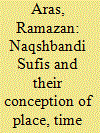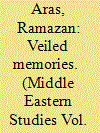|
|
|
Sort Order |
|
|
|
Items / Page
|
|
|
|
|
|
|
| Srl | Item |
| 1 |
ID:
165738


|
|
|
|
|
| Summary/Abstract |
The employment of diverse forms of security and control on territorial borders have led to the production of numerous events of border crossings, smuggling, banditry and death along with stories of separation, loss, mourning, pain, and yearning in the everyday life of border people. The Naqshbandi Khaznavi order has an expansive interpersonal social network across the political borders of Turkish and Syrian nation-states. This work analyzes the ways in which Sufis dealt with diverse aspects of the Turkish-Syrian border by unbinding shackles and orders of political system that were fabricated constantly from the 1920s to the early 1980s. The life stories and narratives of the Sufis document the existence of a religious-cultural landscape, diversifying the perception of place, time and fear which have transcended political borders for decades, contradicting official cartographic imagination and the modern-secular understanding of place and time. Besides, in addition to analyses of religious orders as social, economic and political entities, this work aims to elucidate emotional aspects of relations and faith that coexist between Sufis and their Sheikh in the context of spatial distance, political border and fear of death.
|
|
|
|
|
|
|
|
|
|
|
|
|
|
|
|
| 2 |
ID:
174151


|
|
|
|
|
| Summary/Abstract |
Under the omnipresence of surveillance, control and fear of the state as ontological signifiers, not only agency but also subjective and collective memories of people become unspeakable, hidden and veiled. This paper aims to underline the difficulties of doing ethnographic research on the secular Turkish state formation and its diverse apparatuses with a particular focus on the single-party regime that started in 1923 and ended in 1950. This work claims that fear of the state, inaccessibility of the state archives, the inscription of protective laws such as lèse-majesté for founding figures of the state, and the senility of survivors result in muteness, the emergence of politics of forgetting and remembering that diminish the possibility of studying relations between the authoritarian secular state and its Muslim subjects. It is argued that the hegemony of emotions of fear of the state and insecurity have turned historical and ethnographic research on the subject matter into a difficult one. Based on a recently conducted large-scale oral history study in different parts of Turkey, this paper also analyzes the resistance, resilience, and silence of mass Muslim population towards diverse forms of state-sponsored authoritarian secular politics along with western and Turkish nationalist top-down regulations of the new regime.
|
|
|
|
|
|
|
|
|
|
|
|
|
|
|
|
|
|
|
|
|